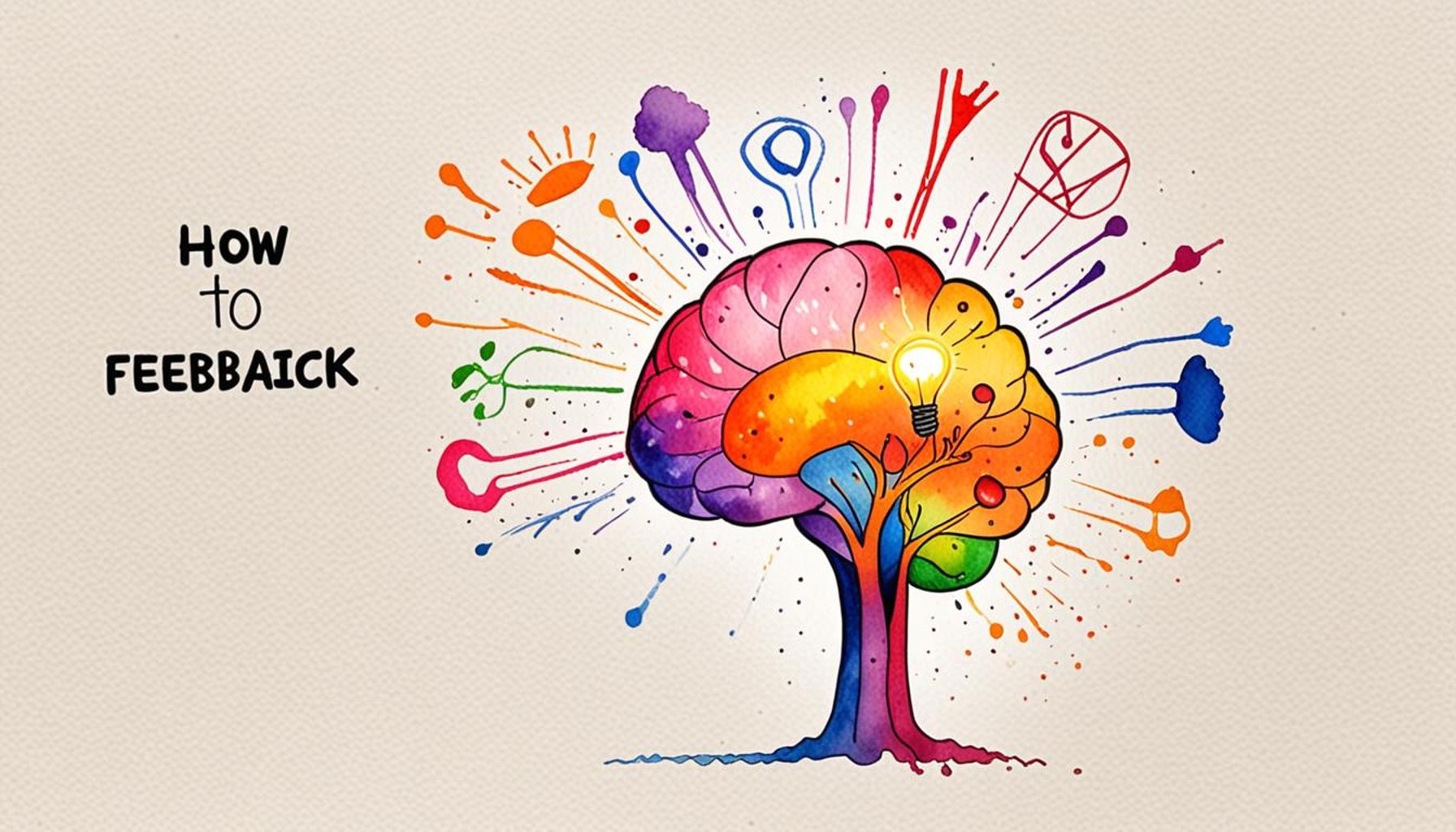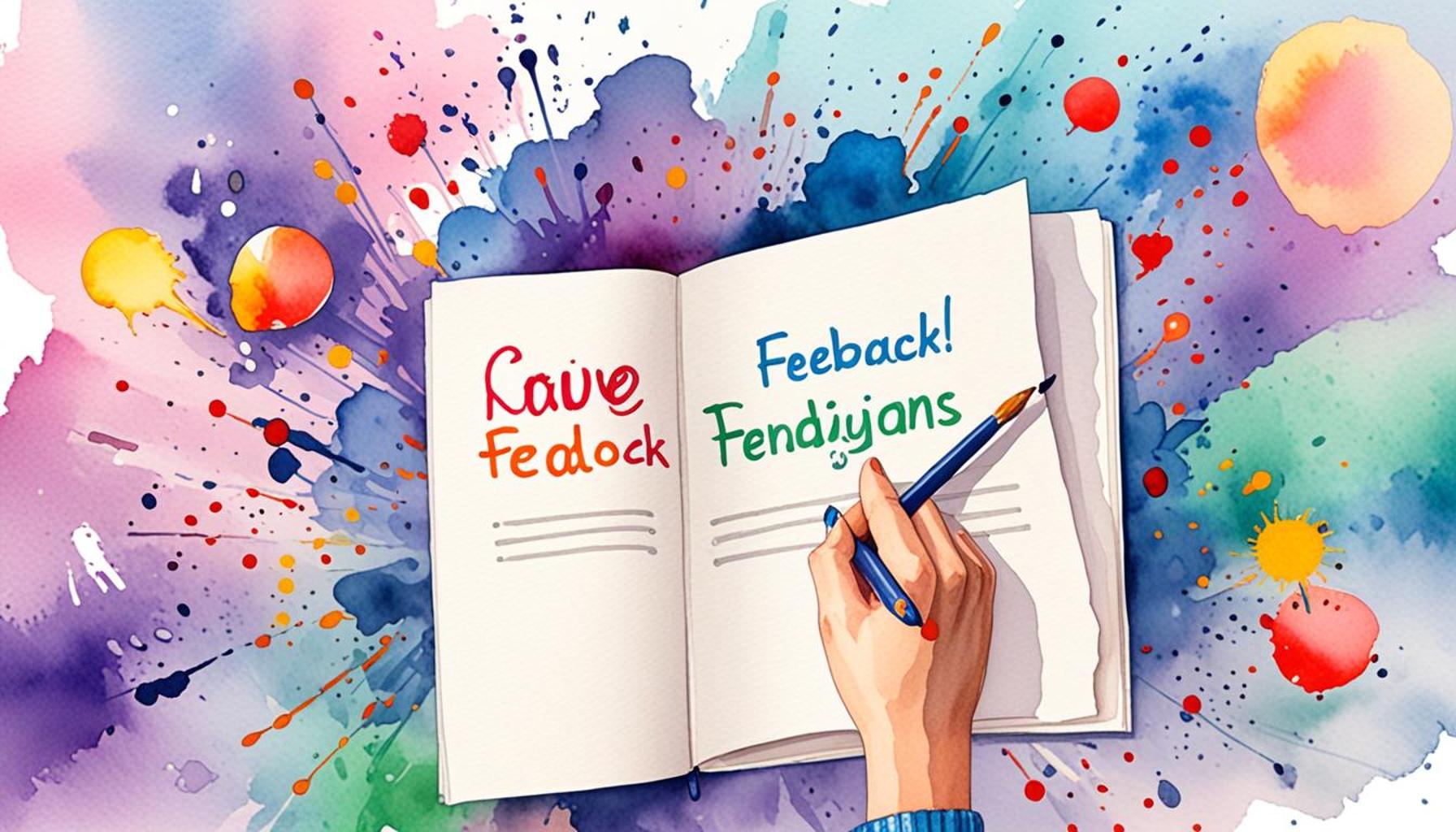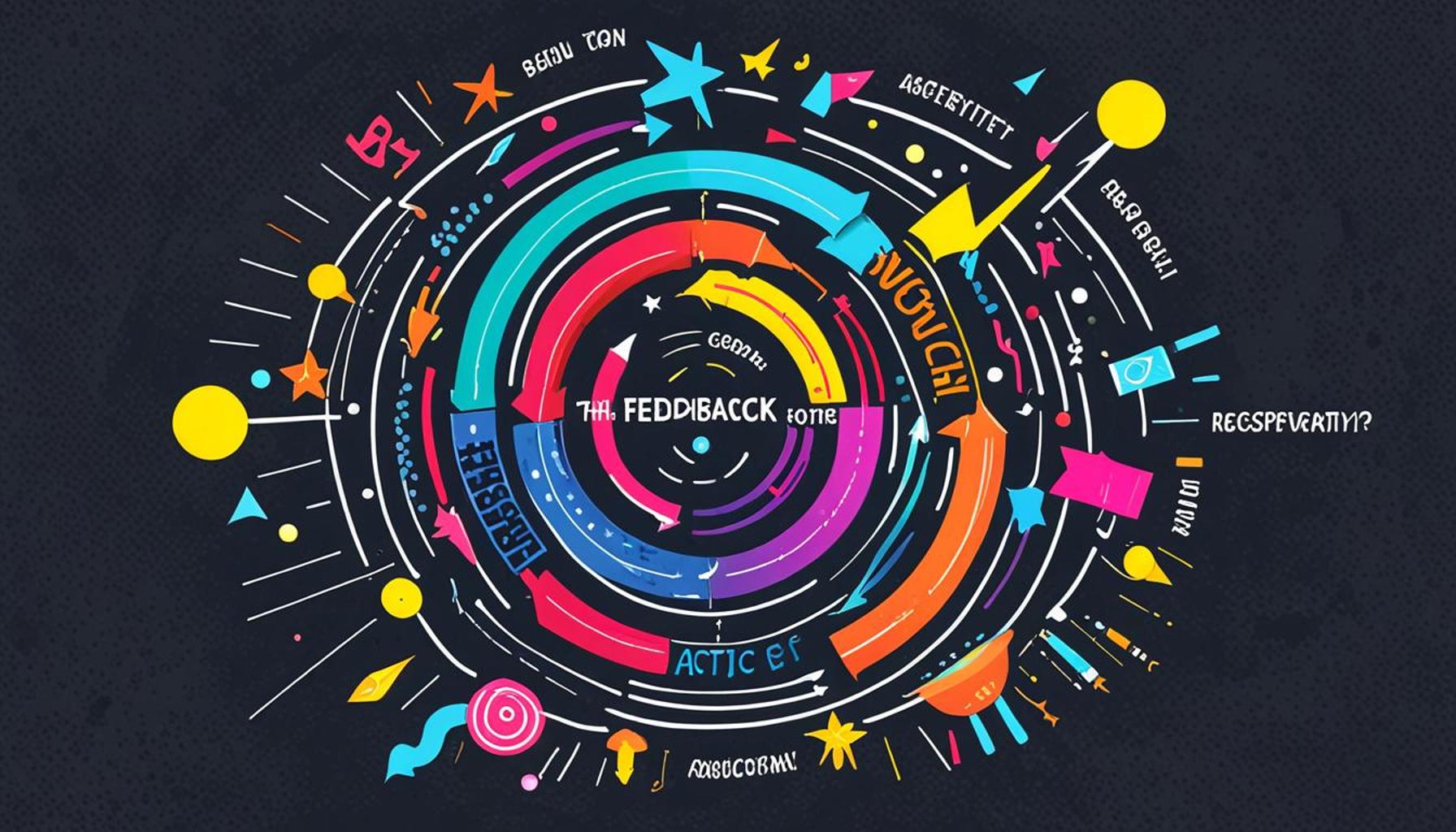How to Incorporate Feedback Constructively to Foster a Growth Mindset

Harnessing the Power of Feedback for Personal and Professional Development
In today’s fast-paced world, feedback serves as a cornerstone for personal and professional development. Unlike mere opinion, constructive feedback provides invaluable insights that can lead to growth and enhancement in various aspects of life and work. The ability to incorporate feedback constructively is vital, particularly in a diverse and evolving landscape like Nigeria, where flexibility and adaptability are crucial for achieving success.
But what constitutes receiving feedback in a constructive manner? It involves several key aspects that can transform interactions into opportunities for growth:
- Open-mindedness: Approach feedback with a willingness to learn rather than defensiveness. This perspective allows individuals to perceive criticisms as stepping stones for improvement.
- Self-reflection: After receiving feedback, it is essential to spend time evaluating how it aligns with your personal and professional objectives. Consider whether the feedback highlights areas for enhancement or reaffirms your strengths.
- Strategic application: It’s not enough to simply hear feedback; implementing changes based on the insights gained is critical. For instance, if feedback suggests enhancing communication skills, actively practicing speaking and listening can yield significant improvements over time.
The practice of incorporating feedback not only fosters individual growth but also cultivates a dynamic environment conducive to collective advancement. For example, in many traditional Nigerian communities, the older generation imparts wisdom through storytelling and guidance. This informal feedback mechanism plays a crucial role in shaping the values and behaviors of the youth, demonstrating the timeless power of constructive criticism.
In modern workplaces, organizations that prioritize collaboration create an environment where feedback becomes a central element of daily interactions. Companies can establish regular feedback loops through performance reviews, peer assessments, and informal check-ins, encouraging employees to share insights and support one another in achieving goals.
This article will delve deeper into various techniques and real-world examples illustrating how fostering a growth mindset can be achieved through effective feedback. Whether within educational settings, corporate structures, or community dynamics, the art of giving and receiving feedback is fundamental to motivating individuals and teams to break barriers and realize their full potential.
As readers consider the integral role feedback plays in their lives, investigating local case studies, frameworks, and success stories in Nigeria may yield further inspiration on how to embrace feedback for ultimate growth.
ADDITIONAL INSIGHTS: Expand your understanding here
Creating a Culture of Feedback: The First Steps
To successfully incorporate feedback constructively and foster a growth mindset, one must first focus on developing a culture that embraces feedback in all its forms. This culture requires commitment from both individuals and organizations. In Nigeria, where community ties are strong, establishing open lines of communication can lead to a richer understanding between colleagues, family members, or students and mentors.
One effective way to nurture this culture is by emphasizing the importance of regular and structured feedback sessions. Here are several strategies that can help:
- Establish Clear Expectations: Setting specific goals for feedback allows everyone involved to know what to expect. This clarity not only improves the quality of the feedback given but also ensures that it is aligned with the individual’s or team’s objectives.
- Encourage Peer-to-Peer Feedback: By fostering an environment where employees or students can provide feedback to one another, a sense of camaraderie can develop. This mutual exchange of insights can highlight diverse perspectives, leading to more comprehensive personal development.
- Utilize Digital Tools: With the growing reliance on technology, employing platforms like Slack, Trello, or Google Workspace can facilitate continuous feedback. These tools allow for real-time communication and make it easier to track and incorporate feedback into daily tasks.
Moreover, feedback should be viewed as a two-way street. Individuals providing feedback should be equipped with the necessary skills and training to articulate their thoughts constructively. For instance, utilizing the “sandwich method” —delivering a piece of positive feedback, followed by constructive criticism, and closing with another positive remark—can ensure that the receiver is more receptive and less defensive.
Context is also important. In Nigerian workplaces, understanding cultural dynamics can play a significant role in how feedback is interpreted and responded to. For example, respect for hierarchy is deeply ingrained in many Nigerian organizations. Hence, feedback from senior colleagues may carry more weight and require different handling compared to feedback from peers. Acknowledging these nuances fosters trust and openness in the communication process.
Furthermore, embracing a growth mindset involves recognizing that intelligence and abilities can be developed through dedication and hard work. This belief can be transformative, as it empowers individuals to view challenges as opportunities for learning rather than threats to their competence. When feedback is incorporated into this framework, individuals are more likely to approach criticism with curiosity and eagerness for self-improvement.
By creating a robust culture of feedback that prioritizes clear communication, respect, and mutual growth, individuals and organizations can unlock their potential. This process transforms feedback from a daunting experience into a valuable tool for advancement, allowing everyone involved to thrive in their personal and professional journeys.
| Category | Description |
|---|---|
| Active Listening | Engaging fully with the feedback, allowing for a better understanding and enhancement of personal growth. |
| Constructive Criticism | Providing feedback that is specific and actionable can significantly enhance the learning process and reinforce a growth mindset. |
| Feedback Framework | Using structured approaches such as the SBI model (Situation-Behavior-Impact) can help in delivering effective feedback that fosters improvement. |
| Encourage Reflection | Encouraging individuals to reflect on feedback allows for deeper learning and strengthens a growth-oriented perspective. |
Incorporating feedback constructively is essential in fostering a growth mindset. Active listening not only helps individuals grasp the intent behind the feedback but also allows for dialogue that enables clarification and deeper understanding of the areas needing improvement. Meanwhile, constructive criticism, provided in a specific and actionable format, serves as a catalyst for engaging in developmental practices beneficial for long-term growth.The Feedback Framework is invaluable as it helps structure discussions that empower the receiver with clarity on what practices to carry forward. The SBI model is one such method that gives a clear roadmap for delivering feedback, ensuring it is both supportive and instructive, which resonates positively with individuals striving for improvement.Lastly, encouraging reflection allows the feedback process to transform from mere observation to an insightful exploration of personal and professional development opportunities. Building a culture of reflection and constructive feedback ultimately cultivates an environment rich in learning and personal growth.
SEE ALSO: Click here to read another article
Transforming Feedback into Action: Practical Steps to Implementation
Once a culture of feedback has been established, the next step involves translating feedback into meaningful actions that reinforce a growth mindset. This process entails more than merely receiving responses; it requires a structured approach to implementing changes based on constructive criticism. In Nigerian workplaces, where tradition sometimes dictates behavior, smoothing the transition from feedback to action is particularly vital.
One effective strategy for achieving this is through actionable feedback. When offering feedback, it is essential for the giver to provide specific, clear, and practical suggestions rather than vague observations. For instance, when discussing presentation skills, instead of saying, “You need to improve your presentations,” a more constructive approach would be, “Consider incorporating more visuals in your slides to engage your audience.” This kind of clarity helps individuals understand exactly what steps they need to take to improve, fostering a proactive attitude towards learning.
Additionally, incorporating regular check-ins can help track progress made after feedback has been given. These follow-ups can be informal and should focus on recognizing improvements while challenging individuals to set new goals. This approach not only reinforces a growth mindset but also demonstrates that development is an ongoing journey rather than a one-time event. In educational settings, for example, teachers can conduct weekly reviews with students to discuss their performance, helping them adjust their study strategies as needed.
Moreover, it is crucial to celebrate progress and achievements, no matter how minor they may seem. Recognizing effort fosters motivation and creates an environment where individuals feel safe to take risks without the fear of failure. In Nigeria, where communal success is often valued, publicly acknowledging accomplishments within teams—whether in a software company or a local NGO—can significantly boost morale and encourage continued growth.
Another vital aspect of transforming feedback into productive outcomes is encouraging self-reflection. After receiving feedback, individuals should be prompted to reflect on their experiences and identify areas they would like to improve upon. This practice cultivates an inquisitive mindset and allows individuals to take ownership of their development. Reflection exercises, such as journaling or guided discussions with peers, can help solidify the lessons learned from feedback and allow for deeper insights into one’s learning journey.
Incorporating a feedback loop is essential as well. This involves not only accepting feedback but also creating an avenue for individuals to share their experiences regarding the feedback process. In Nigeria’s entrepreneurial landscape, this feedback loop can empower startups to adapt their offerings based on critiques from both customers and team members, ultimately steering their growth trajectory. Businesses that listen to their employees often witness enhanced innovation and responsiveness in their strategies.
Finally, it is essential to recognize that fostering a growth mindset through feedback isn’t solely the responsibility of management or educators; it requires every participant to be actively engaged. Training workshops that emphasize the value of constructive criticism and personal responsibility in growth can instill this mindset across all levels of an organization or community. By prioritizing feedback as a vital component of the growth process, Nigeria can cultivate a culture where individuals are not only receptive to learning but also actively gear themselves towards continuous improvement.
YOU MAY ALSO LIKE: Read read another article
Building a Culture of Growth through Feedback
In conclusion, the journey to incorporate feedback constructively within any organization or educational institution is integral to fostering a growth mindset. By embracing actionable feedback, facilitating regular check-ins, celebrating even minor achievements, and encouraging self-reflection, individuals can transform constructive criticism into tangible growth. These practices not only empower individuals to take charge of their development but also cultivate an environment where continuous improvement is celebrated and prioritized.
In Nigeria, where collaboration often enhances learning experiences, establishing a robust feedback loop enables organizations to respond effectively to the insights and needs of their teams and customers. This adaptability not only strengthens relationships but also drives innovation—a critical factor in today’s dynamic marketplace. As more organizations and educational entities recognize the importance of feedback, they can shift from a compliance-based approach to one that values personal responsibility and ongoing development.
Ultimately, instilling a culture where feedback is viewed as a stepping stone rather than a setback can profoundly impact not just individual growth but collective achievement. As communities progress towards a future where learning from feedback is normalized, Nigeria can harness the true potential of its workforce and students, paving the way for enhanced creativity, resilience, and success. The challenge lies in committing to this transformative approach, but the dividends it pays in nurturing a thriving culture of growth are well worth the effort.


